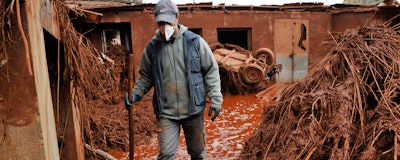
BUDAPEST, Hungary — Two former executives of an alumina plant in Hungary were convicted and sentenced to prison Monday for an industrial disaster that killed eight people and injured more than 220 in flooded towns and villages, a Hungarian court said.
Zoltan B., the former CEO of MAL Zrt., received a prison term of 2 ½ years for public endangerment and other crimes, while Jozsef D., a deputy CEO, received a two-year sentence.
In keeping with privacy rules, the court did not identify the defendants by their full names.
On Oct. 4, 2010, a wall of a huge reservoir of the plant collapsed, flooding three towns and villages with about 2 million cubic meters (528 million gallons) of toxic red sludge and water.
The highly alkaline mix burned the skin of the victims, some of whom were swept away by the force of the rushing flood and drowned. One of the victims was 14 months old.
Eight other people on trial for the 2010 disaster received suspended prison sentences, fines or reprimands, while the city court in Gyor acquitted five. All 15 defendants were acquitted of all charges in 2016, but an appeals court ordered a retrial.
Monday's ruling was appealed by prosecutors, who asked for stricter sentences, and by most of the convicted defendants, seeking leaner penalties.
The trial court ruled that MAL Zrt. managers and employees broke numerous rules regarding the storage and handling of the leftover sludge and water from producing alumina, the main raw material for making aluminum.
"The defendants' negligence contributed to the catastrophe, since they did not deal with the warning signs of a possible breach," the court said in a statement. "And they misled area residents and authorities regarding the true amount and toxicity of water accumulated due to the rule violations, which ultimately became determinant factors of the catastrophe."
The court also said the defendants did not notify authorities or were late doing so regarding the sludge flood and its toxicity. The former CEO also made willfully misleading statements about the dangers of the spill, the court found.
The amount of water stored in the 25-hectare (61.8-acre) reservoir, over 1 million cubic meters (264 million gallons), was more than twice the limit and its toxicity exceeded the permissible level.
In its ruling Monday, the court also faulted poor planning, construction and maintenance of the reservoir.
Environmental group Greenpeace called the convictions "historic" but added that questions about the responsibility of the authorities in charge of overseeing the plant — which in some cases didn't operate according to norms — remained unanswered.
"For Hungary to avoid similar catastrophes in the future, it needs independent and effective authorities," Greenpeace said in a statement. "And strong and operative laws which are able to ensure the most important principle of environmental protection — 'the polluter pays.'"






















